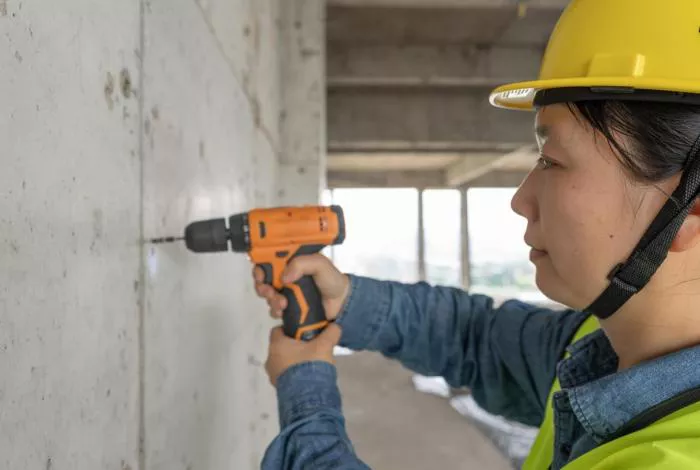Drill bits come in different materials designed for specific applications. Metal drill bits are primarily made from high-speed steel (HSS) or cobalt alloys. These materials work well for drilling through various metals but face challenges when used on harder surfaces.
Concrete requires specialized drill bits because of its abrasive nature and composite structure. The aggregate materials in concrete can quickly dull standard metal bits. Professionals always match the drill bit material to the workpiece material for optimal performance.
The Composition Difference Between Metal and Concrete Bits
Metal drill bits feature a sharp cutting edge designed to shear through ductile materials. They have a precise point angle that works well for metal fabrication. The flutes on metal bits are optimized for chip removal in continuous metal drilling operations.
Concrete drill bits use tungsten carbide tips or diamond coatings to handle abrasion. Their tip geometry resembles a spade shape rather than a sharp point. This design helps fracture the concrete material rather than cut it. The carbide tips withstand the crushing action needed for masonry work.
What Happens When You Use Metal Bits on Concrete
Using metal drill bits on concrete leads to several observable problems. The cutting edges become dull within seconds of contact with concrete aggregate. Excessive heat builds up due to friction against the hard surface. This heat can ruin the temper of the steel, permanently damaging the bit.
The drill motor also struggles as metal bits aren’t designed for the hammering action of masonry drilling. Without proper impact support, the bit may snap or the drill’s internal mechanism may fail. Users often notice increased drilling time and decreased accuracy when using improper bits.
Technical Limitations of Metal Bits in Concrete
Metal drill bits lack the necessary hardness to penetrate concrete effectively. On the Mohs hardness scale, concrete ranks around 6-7 while HSS bits typically rate 7.5-8. This close hardness matching causes rapid wear. Concrete also contains silica which acts as an abrasive against metal surfaces.
The cutting mechanics differ fundamentally between metal and concrete drilling. Metal drilling relies on continuous shearing while concrete drilling requires impact fracturing. Standard twist drill geometries can’t create the necessary percussion effect for efficient concrete penetration.
Potential Risks and Safety Concerns
Attempting to use metal bits on concrete presents several safety hazards. Broken bits can become projectiles when they snap under pressure. Overheated bits may cause burns or damage the drill motor. The improper application also stresses the power tool beyond its designed capacity.
Poor drilling performance leads to user frustration and potential loss of control. Inaccurate holes may compromise structural integrity in construction applications. There’s also increased risk of electrical shock when drilling near wiring with compromised bits.
Proper Alternatives for Concrete Drilling
Masonry bits specifically designed for concrete offer the right solution. These feature carbide tips brazed onto steel shafts for durability. Rotary hammer drills with SDS-plus or SDS-max chucks provide the necessary impact energy for efficient concrete penetration.
For occasional concrete work, carbide-tipped masonry bits in standard drill chucks work acceptably. Diamond core bits become necessary for large diameter holes or reinforced concrete. Always select the bit type matching your specific concrete composition and drilling requirements.
Cost Analysis: Short-Term Savings vs Long-Term Expense
While metal bits may seem like a cost-saving option initially, they prove more expensive in practice. The rapid wear requires frequent replacement when used on concrete. Damaged bits may also ruin workpieces or require expensive redos.
Quality masonry bits last significantly longer in concrete applications. Their higher initial cost spreads over hundreds of holes rather than just a few. Proper tool selection reduces total project costs through improved efficiency and reduced waste.
Expert Recommendations for Concrete Drilling
Tool professionals universally recommend against using metal bits for concrete. They suggest investing in proper masonry bits for any concrete work. For mixed material projects, consider multi-purpose bits designed for both wood and light masonry.
Always use the correct drilling technique for concrete. Apply steady pressure without forcing the bit. Use hammer mode on compatible drills and clear dust frequently. Keep bits cool and sharp for best performance and longest service life.
Conclusion
Metal drill bits should never be used for concrete drilling applications. The material mismatch causes rapid bit failure, poor performance, and potential safety hazards. Always select purpose-made masonry bits with carbide tips or diamond coatings for concrete work. Proper tool selection ensures efficient operation, quality results, and long-term cost savings. Invest in the right bits for your specific material to achieve professional outcomes in all drilling projects.
Relate topics:

